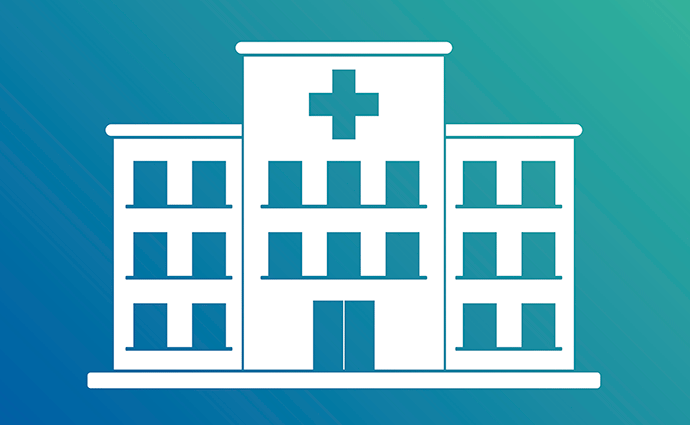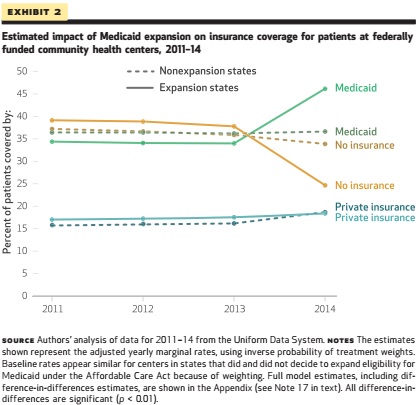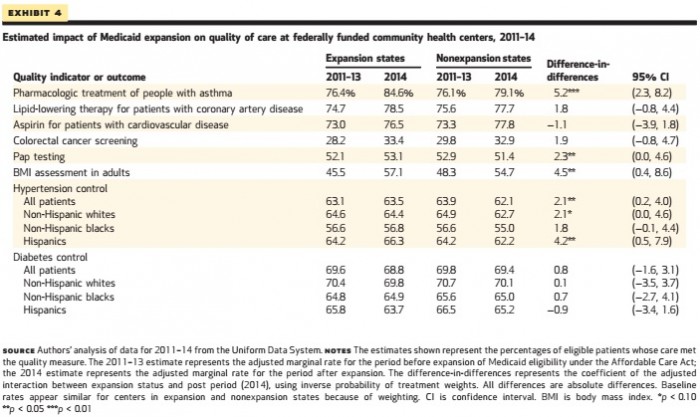Medicaid Expansion Boosts Coverage, Quality at Health Centers
Health centers in Medicaid expansion states saw uninsured rates decrease, Medicaid coverage increase, and care quality on four measures improve, a study showed.

Source: Thinkstock
- Federally funded health centers in states that underwent Medicaid expansion through the Affordable Care Act faced higher levels of insured patients and improved care quality compared to their peers in non-expansion states, a recent Health Affairs study found.
Using Health Resources and Services Administration (HRSA) data from 2011 to 2014, Brown University researchers revealed that uninsured rates dropped by 11.1 percentage points among the 492 federally funded health centers studied in Medicaid expansion states.
In addition, Medicaid coverage rates increased by 11.8 percentage points.
The health centers also experienced significant care quality improvements for four out of eight measures, including asthma treatment, Pap testing, BMI assessment, and hypertension control.
“Our findings suggest the possibility of further gains in quality at community health centers as additional states expand eligibility for Medicaid and as more patients acquire insurance after 2014,” wrote study authors. “Gains in quality may be even greater for newly expanding states, since baseline uninsurance rates in these states were higher than rates in states that previously expanded, while quality may erode at centers in states that elect not to expand.”
READ MORE: How the Affordable Care Act Changed the Face of Health Insurance
While Medicaid expansion resulted in significantly greater coverage levels, the 565 health centers in non-expansion states saw substantially less uninsured and Medicaid coverage rate changes. Medicaid coverage remained around 36 percent from 2011 to 2014 and the uninsured rate similarly stayed around the same rate until it dipped slightly under 35 percent in 2014.

Source: Health Affairs
However, federally funded health centers in non-expansion states experienced smaller increases in private coverage versus health centers in Medicaid expansion states.
Based on greater coverage changes stemming from Medicaid expansions, researchers added that federally funded health centers in expansion states saw less uninsured patients and more Medicaid patients in 2014. Only 23 percent of patients at expansion state health centers were uninsured versus 39 percent at non-expansion health centers.
About one-half of patients at expansion state health centers also had Medicaid coverage, whereas only 30 percent of patients were covered by Medicaid at non-expansion health centers.
Increasing the number of Medicaid patients seen may help federally funded health center revenue cycles. While the health centers receive federal funding from the HRSA to operate, only 21 percent of health center revenue stems from federal grants, according to a cited Henry J. Kaiser Family Foundation report.
READ MORE: How Medicaid Expansion Improves Behavioral Healthcare Access
Health centers receive most of their revenue from claims reimbursements, the report stated. Fifty-six percent of federally funded health center revenue comes from claims reimbursement, most of which comes from Medicaid. Therefore, Medicaid revenue continues to be a top source of revenue for the health centers.
Additionally, researchers uncovered quality of care improvements at health centers in Medicaid expansion states. For example, expansion state health centers did significantly better with recommended asthma treatments. Pharmacologic asthma treatment went from 76.4 percent of patients in 2011 to 2013 to 84.6 percent in 2014.
Non-expansion state health centers only boosted the pharmacologic asthma treatments from 76.1 percent from 2011 to 2013 to 79.1 percent in 2014.
Federally funded health centers in Medicaid expansion states also realized significant quality improvements for BMI assessments in adults with a difference-in-differences of 4.5 percentage points, followed by Pap testing with a 2.3 percentage point difference and hypertension control with a 2.1 percentage point difference.

Source: Health Affairs
Researchers noted that hypertension control improvements also varied by race and ethnicity with Hispanics seeing the most improvement at expansion state health centers. While expansion state health centers performed better on overall hypertension control, the health centers performed 4.2 percentage points better than their non-expansion peers.
READ MORE: The Progress and Challenges of the Affordable Care Act
Hispanic patient populations ended up experiencing almost twice as much hypertension control quality improvement than non-white Hispanics.
However, no other quality measure outcomes showed significant changes in quality care based on race or ethnicity.
The study also pointed out that Pap testing and hypertension control quality improvements among federally funded health centers in Medicaid expansion states stemmed from decreases in care quality for these measures at non-expansion health centers.
There were also no other significant differences in quality of care for recommended coronary artery or cardiovascular disease treatment, colorectal cancer screening, and diabetes control. Although, federally funded health centers in Medicaid expansion states showed modest quality improvements compared to non-expansion peers for all eight measures except for cardiovascular disease treatment.
The study’s results suggest that Medicaid expansion implementation can significantly increase healthcare coverage and care quality across health centers. With only 31 states and the Washington DC electing to expand Medicaid, other states may want to consider the benefits before tossing a Medicaid expansion project aside.
“On average, community health centers in non-expansion states had pre-period uninsurance rates that were much higher than pre-period rates in expansion states,” wrote study authors. “Thus, if additional states elect to expand eligibility for Medicaid, we anticipate that the reductions in uninsurance rates and the changes in quality of care will be greater than those observed in this study.”
Care quality deterioration for Pap testing and hypertension control among federally funded health centers in non-expansion states may also indicate that forgoing Medicaid expansion could further decrease quality in health centers, researchers added.
Policymakers should also keep Medicaid expansion coverage and care quality benefits in mind when deciding on a potential Affordable Care Act repeal, researchers added. The healthcare reform law paved the path for Medicaid expansion implementation, but a possible repeal could eliminate the state option.
